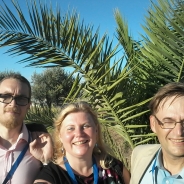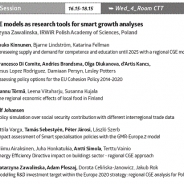Wydarzenia
Prof. Katarzyna Zawalińska (IRWiR PAN) i Dr Adam Płoszaj (EUROREG) zorganizowali wspólnie sesję specjalną na międzynarodowym kongresie Europejskiego Stowarzyszenia Nauk Regionalnych (European Regional Science Association, ERSA), który odbył się 25-28 sierpnia 2015r. w Lizbonie (http://www.ersalisbon2015.org). Zorganizowana sesja nosiła tytuł: Modele równowagi ogólnej jako narzędzia analizy wzrostu opartego na wiedzy (CGE models as research tools for smart growth analyses). Występowali na tej sesji zaproszeni modelarze z czołowych ośrodków europejskich w tej dziedzinie m.in. Finlandii, Norwegii, Hiszpanii, Węgier.
Opis sesji:
The session was devoted to modelling one of the main European priorities from the strategy Europe 2020, which is the smart growth. It means improving the EU's outcomes in terms of education, research and innovation as well as digitalization of the society. In line with this attempts, we propose papers devoted to measurement of the EU's performance in such fields as: education (supply and demand for future competences); R&D investments (means and consequences of achieving national targets); smart specialization; efficient energy resource use in line with Innovation Union (the consequences of Energy Efficiency Directive to regional growth potential) and information flows (within local food economies) - see the list of titles and presenters below.
The smart growth priority is challenging not only from the point of view of achieving its goals (e.g. R&D investment levels to reach 3% of EU's GDP) but also from the point of view of measuring its effects, especially at the regional level. One of the difficulties in measurement is the existence of externalities related to knowledge and also modeling the endogenous growth with links to R&D and other technological spill-over effects. Hence we will exchange the knowledge on the methodological difficulties, data problems and proper interpretation of the results as well as their usefulness for the policy evaluation. The special attention will be given to regional effects of those national policies. We had to necessarily narrow the session topic so we proposed Computable General Equilibrium method as a starting point. However, we appreciate all types of quantitative approaches which can contribute to overcoming of the quantitative difficulties associated with the modelling of the topic and shedding some light on the regional aspects of it.
We believe our proposition will be interesting both for researchers and for the policy makers involved in implementation and evaluation of the smart growth priority in their countries.
Powrót






